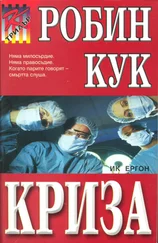Suddenly the whole charade made sense. Philips flipped open the case and pulled out the cassette. It wasn’t a musical recording. It was a computer program.
“How far did we get?” asked Philips almost in a whisper.
“It’s the whole thing,” said Michaels.
“No!” said the incredulous Martin.
“You know the last material you gave me? It worked like a charm. It solved the problem of density and boundary interpretation. This program incorporates everything you’ve included in all your flow sheets. It will read any skull X ray you give it, provided you put it into that piece of equipment over there.” Michaels pointed to the back of Philips’ office. There on the top of Philips’ worktable was a TV-sized electrical apparatus. It was obvious that it was built as a prototype rather than production model. The front was made of a plain stainless steel plate and its attaching bolts protruded. In the upper left-hand corner was a slot that was made to take the program cassette. Two electrical trunks protruded from its sides. One trunk fed into a typewriter input/output device. The other came from a rectangular stainless steel box about four feet square and one foot high. On the front of this metal apparatus was a long shot with visible rollers for the insertion of an X-ray film.
“I don’t believe it,” said Philips, afraid that Michaels was teasing him again.
“Neither do we,” admitted Michaels. “Everything just suddenly fell together.” He walked over and patted the top of the computer unit. “All the work you’d done in breaking down the problem-solving and pattern-recognition aspects of radiology not only made it apparent we needed new hardware but also suggested the way to design it. This is it.”
“Looks simple from the outside.”
“As usual, appearances are deceptive,” said Michaels. “The innards of this unit are going to revolutionize the computer world.”
“And think what it’s going to do to the field of radiology if it can really read X rays,” said Martin.
“It will read them,” said Michaels, “but there could still be bugs in the program. What you have to do now is run the program against as many skull X rays as you can find that you have read in the past. If there are problems, I think they will be in the area of false negatives. Meaning the program will say the X ray is normal when pathology is really present.”
“That’s the same problem with radiologists,” said Philips.
“Well, I think we’ll be able to eliminate that in the program,” said Michaels. “It’s going to be up to you. Now to work this thing, first turn it on. I think even a doctor of medicine will be able to do that.”
“Without doubt,” said Philips, “but we’ll need a Ph.D. to plug it in.”
“Very good,” Michaels laughed. “Your humor is improving. Once the unit is plugged in and turned on, you insert the cassette program into the central unit. The output printer will then inform you when to insert the X-ray film into the laser scanner.”
“What about the orientation of the film?” asked Philips.
“Doesn’t matter, except the emulsion side has to be down.”
“Okay,” said Philips, rubbing his hands together and eyeing the unit like a proud parent. “I still can’t believe it.”
“I can’t, either,” said Michaels. “Who would have guessed four years ago that we could have made this kind of progress? I can still remember the day you arrived unannounced in the Department of Computer Science, plaintively asking if anyone was interested in pattern recognition.”
“It was just pure luck that I bumped into you,” returned Philips. “At the time I thought you were one of the undergraduates. I didn’t even know what the Division of Artificial Intelligence was.”
“Luck plays a role in every scientific breakthrough,” agreed Michaels. “But after the luck, there’s lots of hard work, like what’s facing you. Remember the more skull films you run with the program, the better it will be, not only to debug the program, but also because the program is heuristic.”
“Let’s not pull any big words on me,” said Philips. “What do you mean ‘heuristic’?”
“So you don’t like some of your own medicine,” laughed Michaels. “I never thought I’d hear a doctor complain about incomprehensible words. A heuristic program is one that is capable of learning.”
“You mean this thing will get smarter?”
“You got it,” said Michaels, moving toward the door. “But it’s up to you now. And, remember, the same format will be applicable to other areas of radiology. So in your spare time, as if you’re going to have any, start the flow sheet for reading cerebral angiograms. I’ll talk to you later.”
Closing the door behind Michaels, Philips went over to the worktable and eyed the X-ray-reading apparatus. He was eager to begin to work with it immediately, but he knew the burden of his daily routine proscribed it. As if in confirmation, Helen walked in with a pile of correspondence, telephone messages, and the cheerful news that the X-ray machine in one of the cerebral angiography rooms wasn’t functioning properly. Reluctantly Philips turned his back on the new machine.
“Lisa Marino?” asked a voice, causing Lisa to open her eyes. Leaning over her was a nurse named Carol Bigelow, whose dark brown eyes were the only portion of her face visible. A flower-print hat contained her hair. Her nose and mouth were covered by a surgical mask.
Lisa felt her arm lifted and rotated so the nurse could read her identification bracelet. The arm was replaced and patted. “Are you ready for us to fix you up, Lisa Marino?” asked Carol, releasing the brake mechanism on the gurney with her foot, and pulling the bed out from the wall.
“I don’t know,” admitted Lisa, trying to see up into the nurse’s face. But Carol had turned away saying, “Sure you are,” as she pushed the bed past the white Formica desk.
The automatic doors closed behind them as Lisa began her fateful journey down the corridor to OR #21. Neurosurgery was usually done in one of four rooms: Number 20, 21, 22, or 23. These rooms were fitted out with the special needs of brain surgery in mind. They had overhead mounted Zeiss operating microscopes, closed-circuit video systems with recording capabilities, and special OR tables. OR #21 also had a viewing gallery and was the favorite of Dr. Curt Mannerheim, Chief of Neurosurgery, and Chairman of the Department for the medical school.
Lisa had hoped that she’d be sleeping at this point, but such was not the case. If anything, she seemed particularly aware and all her senses sharp. Even the sterile chemical smell seemed exceptionally pungent to her. There was still time, she thought. She could get out of the bed and run. She didn’t want to be operated on, especially not her head. In fact, anything but her head.
The movement stopped. Turning her gaze, she saw the nurse disappear around a corner. Lisa had been parked like a car at the side of a busy thoroughfare. A group of people passed her, transporting another patient who was retching. His chin was being held back by one of the orderlies pushing the bed, and his head was a bandaged nightmare.
Tears began to run down Lisa’s cheeks. The patient reminded her of her own upcoming ordeal. Her central being was going to be rudely cracked open and violated. Not just a peripheral part of her, like a foot or an arm, but her head... where her personality and very soul resided. Would she be the same person afterward?
When Lisa had been eleven she’d had acute appendicitis. The operation had certainly seemed scary at the time, but nothing like what she was experiencing now. She was convinced that she was going to lose her identity if not her life. In either case, she was fragmenting, and the pieces were there for people to pick up and examine.
Читать дальше












